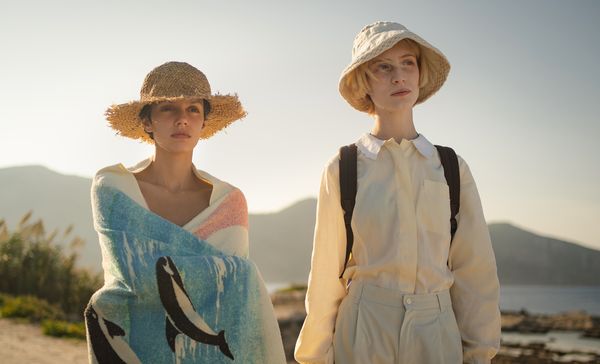 |
| Carlo Sironi: 'Almost everything in the videotape scenes is taken out of what I did when I had my first camera' |
At this year’s Berlin International Film Festival, Sironi shared insights into the origin of his poignant narrative, what makes a coming-of-age movie for him and the contrasting ways in which VHS cameras and phone cameras make us feel.
What inspired you to tell this kind of nostalgic story?
Carlo Sironi: It's really strange because it starts with that song from the end credits, To Wish Impossible Things by The Cure. As I was listening to the song it made me think of water, of summer and then I started to envision those two girls. At the same time, I was wondering why I was thinking of a story in which they ran away from their illness and that they would heal. I started interviewing teens with the same condition as Clara and Irène, even some who were healed. And the movie is true to the reality of the illness. But at the same time, I didn’t want to lose the idea of daydream.
What elements of your childhood did you use to create the story?
CS: I understood that, of course, these two girls reminded me of my friends from high school. I then started rereading my diary and rewatching VHS tapes that I took when I was 18 years old. Almost everything in the videotape scenes is taken out of what I did when I had my first camera. When they are dubbing over the people they are filming, I used to do that.
Why do you think these kinds of vintage images still have an impact?
CS: I think home videotapes can be considered cinema. And cinema at that time, and for a long time, was so powerful because it was so different from reality. You could feel the fabric of the video. And when I was rewatching these videotapes, I noticed that being in front of that camera, at the time, made you feel younger and more childlike. Because it wasn’t as available and it was almost like a magic tool. I think it's just the opposite with phones. You can watch videos of teenagers filming themselves, they really act more like adults than in the past.
The island to which Carla and Irène run away has an almost palpable atmosphere. How did you approach capturing the essence of the setting?
CS: From the very beginning, we felt that an island was perfect. It feels like you leave all your worries behind but you are also in a place that you cannot escape.
It does feel like the island has an identity. How do Carla and Irène’s personalities intertwine with the space?
CS: I think nature sort of clashes with you at that age. You're astonished by the fact that you are just part of nature. I mean, I showed them as if they are parts of the island, you know, just like rocks, clouds and water. They are not different from what surrounds them.
How did the actresses contribute to shaping the characters you first envisioned?
CS: If you are directing too much, you will never see their idea, the way they feel about the characters. So for this movie, in particular, I think I allowed them to be free at the beginning of every take. Because sometimes, actors have a much more precise insight into what you are doing.
This is a coming-of-age film with almost no adult presence. What do you think people will take away from this aspect of the story?
CS: You just see adults in the background. So there is no gaze upon the protagonists. Their young perspective matters more. And that is why they escape very easily, with no one around to see them. Because reality doesn’t matter at certain moments. At that age, it was possible to just disappear.
What do you consider the key element of a coming-of-age story? What aspects make it resonate with audiences?
CS: Besides the nostalgia, it's about a feeling which is lost in adulthood - the complexity of simple things. And I think the audience has the possibility to reflect on daily life as if they were 17 years old. I think this is what we were trying to do when we were making this film.
How was the departure from Sole, your feature debut, to a film which is perhaps more joyful?
CS: I really wanted to tell a story from a teenager's perspective. And even before Sole, I had the idea. I remember taking notes about it. When Sole was released, I came back to this story and realised I needed to grasp filmmaking from a different perspective.






















